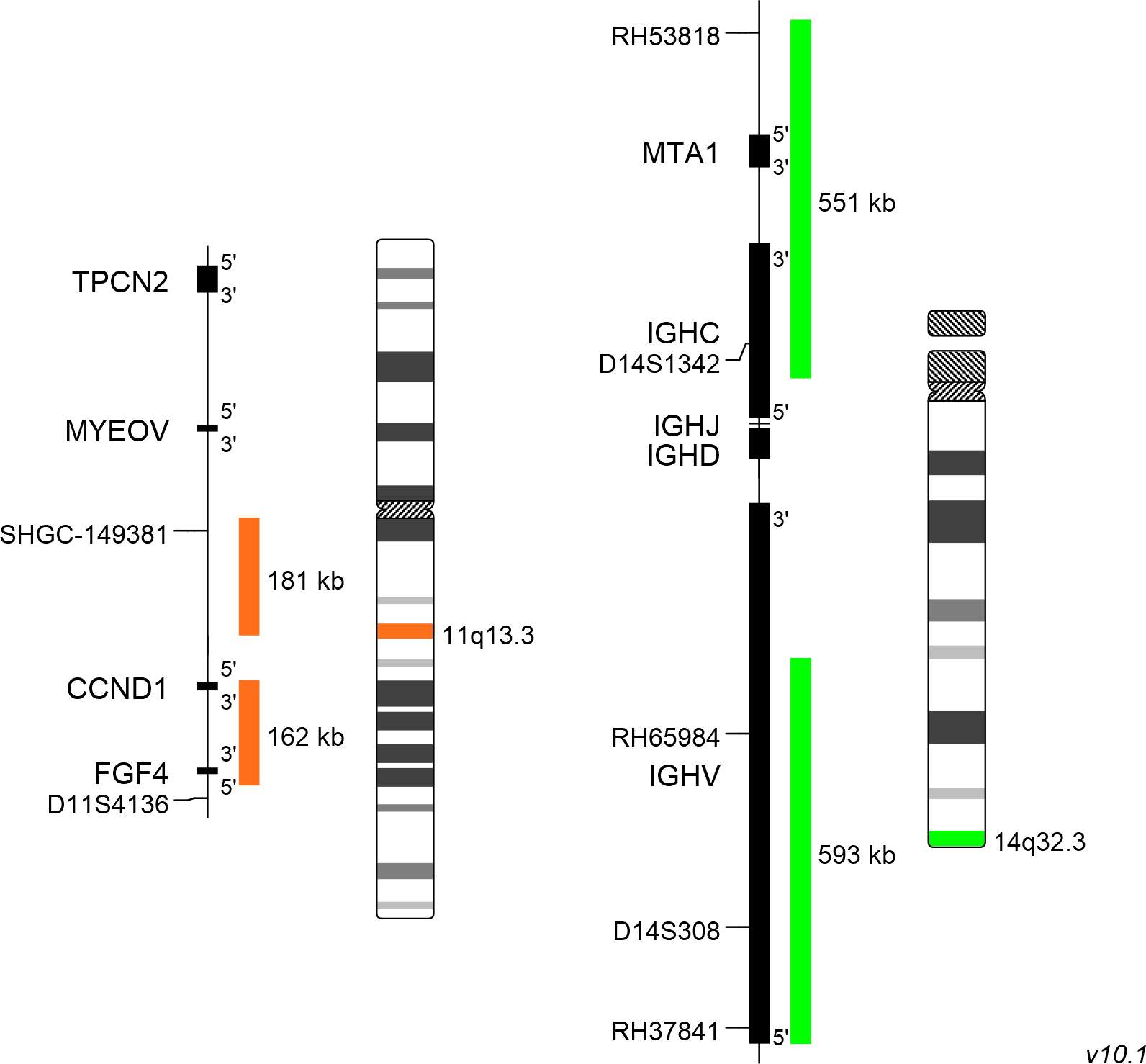SONDY / MetaSystems
XL t(11;14) CCND1/IGH DF

XL t(11;14) CCND1/IGH DF is designed as a dual fusion probe. The orange labeled probe hybridizes to region 11q13 including CCND1, the green labeled probe flanks the IGH breakpoint region at 14q32.
Mantle cell lymphoma (MCL) is a rare subtype of B-cell non-Hodgkin lymphoma (NHL) with an aggressive clinical course. MCLs represent 6-8% of all NHLs. However, 95% of all MCLs are positive for the translocation t(11;14)(q13;q32). To a lower extent, t(11;14)(q13;q32) has also been detected in approx. 20% of B-cell prolymphocytic leukemias, 3-5% of plasma cell myelomas/ multiple myelomas (MM), and in rare cases (<1%) of B-cell chronic lymphocytic leukemia (CLL). The breakpoints within the IGH locus are different in MM and MCL genomes containing translocation t(11;14). The translocation results in juxtaposition of the immunoglobulin heavy-chain (IgH) locus with the cyclin D1 (CCND1) gene locus, which is not transcribed in normal B-cells. As a result, cis IgH enhancer elements take over the transcriptional control of CCND1 leading to deregulated CCND1 expression (e.g. overexpression in MCL). CCND1 coordinates growth signals with cell cycle progression playing a key role in the regulation of the G1 to S phase transition. Additionally, it was shown that some oncogenic effects of t(11;14)(q13;q32) are not directly attributable to the deregulated CCND1 expression, but rather to epigenetic downstream mechanisms such as CCND1 locus methylation and histone acetylation.
Since MCL is an aggressive B-cell neoplasm with a median survival of 3–5 years and has a poor response to traditional chemotherapeutic approaches, distinction of MCL from other lymphoproliferative disorders by differential diagnosis is of great importance.
In multiple myeloma (MM), t(11;14) is the most common translocation, detectable by FISH in about 15-20% of all MM patients. Conventional cytogenetics has a much lower sensitivity, detecting t(11;14) in about 5% of MM patients.
Cena za kus: pro registrované
Mantle cell lymphoma (MCL) is a rare subtype of B-cell non-Hodgkin lymphoma (NHL) with an aggressive clinical course. MCLs represent 6-8% of all NHLs. However, 95% of all MCLs are positive for the translocation t(11;14)(q13;q32). To a lower extent, t(11;14)(q13;q32) has also been detected in approx. 20% of B-cell prolymphocytic leukemias, 3-5% of plasma cell myelomas/ multiple myelomas (MM), and in rare cases (<1%) of B-cell chronic lymphocytic leukemia (CLL). The breakpoints within the IGH locus are different in MM and MCL genomes containing translocation t(11;14). The translocation results in juxtaposition of the immunoglobulin heavy-chain (IgH) locus with the cyclin D1 (CCND1) gene locus, which is not transcribed in normal B-cells. As a result, cis IgH enhancer elements take over the transcriptional control of CCND1 leading to deregulated CCND1 expression (e.g. overexpression in MCL). CCND1 coordinates growth signals with cell cycle progression playing a key role in the regulation of the G1 to S phase transition. Additionally, it was shown that some oncogenic effects of t(11;14)(q13;q32) are not directly attributable to the deregulated CCND1 expression, but rather to epigenetic downstream mechanisms such as CCND1 locus methylation and histone acetylation.
Since MCL is an aggressive B-cell neoplasm with a median survival of 3–5 years and has a poor response to traditional chemotherapeutic approaches, distinction of MCL from other lymphoproliferative disorders by differential diagnosis is of great importance.
In multiple myeloma (MM), t(11;14) is the most common translocation, detectable by FISH in about 15-20% of all MM patients. Conventional cytogenetics has a much lower sensitivity, detecting t(11;14) in about 5% of MM patients.
Cena za kus: pro registrované




